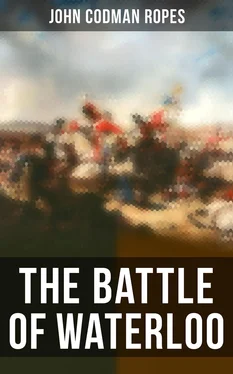It may be remarked that the controversies which have been waged in regard to the truth of Napoleon’s statement that he, on the 15th, gave Ney verbal orders to seize and occupy Quatre Bras, have deflected the attention of historians from the subject now under consideration,—the conduct of d’Erlon in regard to the march of the 1st Corps on the 15th,—a subject closely connected, as we shall hereafter see, with the operations of the army on the succeeding day.
In regard to the much vexed question referred to above, we shall say nothing here. It is not pretended that Napoleon gave to Ney on the 15th any written orders to go to Quatre Bras. Napoleon’s statement91 that he gave him verbal orders to that effect has been denied, and is widely disbelieved. We prefer, for many reasons, to confine our narrative to generally admitted facts, or to those which admit of definite proof. What we have to say about this matter will be found in the Notes to this chapter.
In summing up the situation, we may fairly conclude, that, with the exception of the backwardness of the 1st Corps, the progress made during the day had been satisfactory to the Emperor. He says himself:—
“All the Emperor’s manœuvres had succeeded to his wishes; he had it thenceforth in his power to attack the armies of the enemy in detail. To avoid this misfortune, the greatest that could befall them, the only means they had left was to abandon the ground, and assemble at Brussels or beyond that city.”92
Napoleon had in fact concentrated in front of Fleurus a sufficient force wherewith to fight the Prussians, if, as he thought it not unlikely, they should risk a battle on the next day. He was not apprehensive of the Anglo-Dutch army joining their allies in this battle, for Wellington, as he calculated, could not concentrate in season a sufficient force to overcome the two corps which, under Ney, he intended should occupy Quatre Bras the next forenoon. He had purposely abstained from occupying Sombreffe, for he feared that if he did this, Blücher, finding his communications with Wellington blocked at this point, would retire without a battle, and endeavor to effect a junction with the English at Wavre, or elsewhere to the northward; whereas, so long as the road which connected his army with that of Wellington remained free, Blücher might with confidence be expected to risk a battle for the preservation of that line of communication, that is, at or near Fleurus, with the expectation of being reinforced by his ally. But if he ventured upon this course, Napoleon expected to beat him, for Napoleon calculated that, by the occupation of Quatre Bras the next morning, he could prevent Blücher’s receiving any assistance from his Anglo-Dutch allies.
A letter93 written by Baron Fain, one of the Emperor’s secretaries, to Joseph Bonaparte, dated Charleroi, June 15th, at 9 o’clock in the evening, states that the Emperor has just returned, very much fatigued, having been on horseback since three in the morning, and has thrown himself on his bed for a few hours’ repose; but that he will mount his horse again at midnight. This, however, as we shall see hereafter, he did not do, as at midnight Marshal Ney came to confer with him, having just ridden back from his extreme front at Frasnes.
1. Marshal Ney was acting under considerable disadvantage during this afternoon and evening. We have spoken of this subject before. His difficulties are well pointed out by Colonel Maurice in a recent paper,94 in which much stress is laid, and very justly, on the fact that Ney had not with him a proper staff. It is true that Ney was no neophyte in the practice of war, and that he was perfectly well known to his corps-commanders, and in fact to his entire command. But he arrived at the front late in the day,—at nearly five o’clock in the afternoon,—and with but a single staff-officer. It was only natural and right that he should personally occupy himself with the conduct of the advance to Frasnes, that he should accompany the cavalry, and should attend to the posting of Bachelu’s infantry division in support. And he may very possibly have found the leading division of the 1st Corps, Durutte’s, between Jumet and Gosselies95 on his return, late in the evening, from Frasnes to the latter place. That the 1st Corps had not fully executed its part of the programme must have been, however, only too plain to him; and the necessity of exerting himself energetically to bring it up to the front96 if he would have his whole command well in hand for to-morrow’s work must have appeared, in view of d’Erlon’s slowness, most imperative. At least, there is every reason to suppose this.
2. As to whether Napoleon accomplished as much as he had intended to accomplish, or as much as he ought to have intended to accomplish, on this day of the fifteenth of June, writers have differed. Those who, like Jomini and Charras,97 maintain the theory that his intention was to seize both Sombreffe and Quatre Bras at once, and those who, like Rogniat, insist that this ought to have been his intention, whatever it may in reality have been, hold that the operations of this first day were incomplete. Jomini says:—98
“Napoleon had to renounce the idea of pushing on the 15th as far as Sombreffe and Quatre Bras, which were to be the pivots of all his after movements.” “One may feel assured,” says Charras,99 “that the haste which Napoleon intended should characterize the march of the army had for its object the occupation of Quatre Bras and Sombreffe on the first day of the campaign. This occupation failed, in consequence of a considerable loss of time; the principal avenue of communication between Blücher and Wellington remained free, although menaced; it is for this reason that we hold that Napoleon told the truth in writing that ‘this loss of time was very injurious’ and that we add,—the day of the 15th had been incomplete.”
The passage to which Charras here refers is to be found in the Memoirs,100 and it runs thus:—
“On the same day [the 15th], the attack of the woods before Fleurus, which had been ordered to commence at four o’clock in the afternoon, did not take place until seven o’clock. Night came on before the troops could enter Fleurus, where it had been the project of the chief to place his headquarters that very day. This loss of seven [ sic ]101 hours was very injurious at the opening of a campaign.”
A. Let us first consider this question so far as it affects the operations of the centre and right of the army,—that is, with reference to the non-occupation of Sombreffe on the 15th.
Rogniat’s criticism, that the Emperor ought to have aimed at seizing Sombreffe on the 15th, is especially interesting, as it was answered by Napoleon himself from St. Helena.
“He [Napoleon] ought to have carried his whole army the same day as far as Fleurus, by a forced march of eight to ten leagues, and to have pushed his advance guard as far as Sombreffe; but, instead of hastening to arrive in the midst of his enemies, he stopped at Charleroi, whether because he was retarded by the bad weather or for other motives.”102
To this Napoleon replied:—103
“The Emperor’s intention was that his advance guard should occupy Fleurus,104 keeping [the bulk of] his troops concealed behind the wood near this city;105 he took good care not to let his army be seen, and, above all, not to occupy Sombreffe .106 This [the occupation of Sombreffe] would of itself have caused the failure of all his manœuvres; for then Marshal Blücher would have been obliged to make Wavre the place for the concentration of his army, the battle of Ligny would not have taken place, and the Prussian army would not have been obliged to give battle [as it did] in its then not fully concentrated condition, and not supported by the English army.”
Читать дальше












